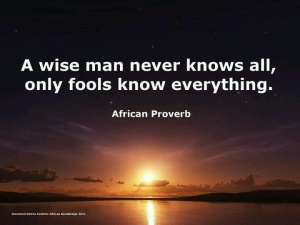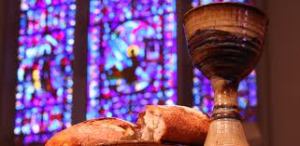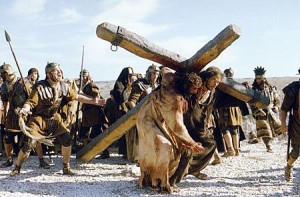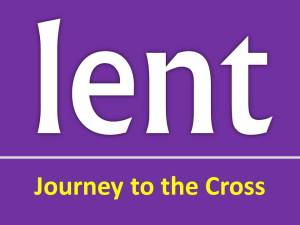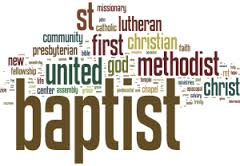Let’s think for a minute what it did for this poor blind man when the disciples began a theological debate over his blindness.
“So, they say you were born blind? Well, let get out our Bibles and see if we can find some theological reason for your blindness. It has to be because of sin. But since you were born blind, perhaps it’s not your sin that is to blame but the sins of your parents.”
Yes, I’m sure all of that theologizing and rationalizing did a whole lot for that poor man.
But how often have we’ve been guilty of doing the same. For some reason, because we are religious, or at least, spiritual people, we believe it is our ordained duty to try to explain human suffering and misery in light of our faith in God.
When the earthquake and Tsunami struck Japan a few years ago, like the Tsunami that struck Southeast Asia years before, I heard some preachers say that it is because Japan was not a Christian nation.
When terrorists destroyed the World Trade Center Towers on 9-11, they said that corporate greed was to blame.
When Hurricane Katrina devastated New Orleans and Gulfport, I heard some blame it on all the new casinos that had been built in the region.
And whenever there is an outbreak of strong storms, tornadoes, wildfires or landslides, I have heard plenty of Christians say, “God must be trying to get our attention!”
For whatever reason, when suffering occurs, we believe God must have had some pretty good reasons to allow it.
In the face of human pain and suffering, there are two predominate explanations that are usually given by the church.
The first one is the one I usually hear from the TV evangelists and conservative pulpits. God is sitting at the command center in complete control of every earthly thing that happens. God has got a plan for the world, and it’s a good plan, but we as limited human beings may not always be able to figure that plan out. Who knows? Maybe people who suffer deserve to suffer. But we do know this: God’s judgments are always just. You just have to have faith and believe. You have to trust that God has his reasons, has his driving purposes for everything that happens.
The other response comes from more liberal scholars. And that is one of silence, just silence. God is large and God is indescribable. Life, and the suffering that comes with it, is utterly mysterious. We simply have no answers to our “why” questions—silence.
Frankly, I believe both of these responses are terrible, to say the least. First of all, those who believe God has some kind of divine, driving purpose for every evil thing that happens in this world, in my estimation, paint a very evil and anti-christ portrait of God.
And those who respond with silence, those who refuse to say anything at all in response to human suffering, make God out to seem detached and aloof. God is watching us, but from a distance. Thus, God is reduced to this a mysterious abstraction devoid of any real meaning.
However, the gospels paint a very different image of God through the words and works of Christ. I believe the life, suffering and death of Christ teach us that when the landslide shook the earth in Washington, so quivered the very heart of God. As the earth rolled down and toppled homes and lives, so rolled down the very tears of God. As the lives of many were suddenly were poured out, so emptied the very self of God. God was not causing the evil. Neither was God silent.
This is where I believe our Gospel lesson this morning is especially helpful. When Jesus is questioned about this man’s lifetime of pain and suffering by his disciples, Jesus really doesn’t answer the question, but neither is he silent. Jesus responds by pointing out that this was a good opportunity, not for theological debate, not to assign blame or responsibility, but rather, to bend to the ground, spit in the dirt, and get his hands dirty, so that the glory of God might be revealed. Jesus responds to human suffering and misery by bending to the ground, getting his hands dirty to bring about healing and wholeness.
And with that, a huge argument ensues. But notice that Jesus refuses to engage in the argument. Jesus is not interested theological debate or speculation. Jesus is interested in simply being there with the man, touching the man, thus revealing the peculiar glory of our God and power of out God.
When I was in college, one of my favorite professors was Dr. Bobby Bell. During my junior year, Dr. Bell was diagnosed with a terminal cancer. I had the wonderful opportunity to take what would be his last class. He was a sociology professor; however, he would often share his faith in class.
ll never forget the time when one of my classmates asked Dr. Bell if he ever felt that God had some reason for allowing his cancer. “
God did not give me this cancer. I am a human being. And human beings sometimes get cancer. I have cancer because I am human, and not for any other reason. I don’t believe for a minute that God wants me or anyone to have cancer. That’s why I believe during this time of suffering and pain, I have sensed, in a way that I have never sensed before, the very intimate, near presence and love of Christ in my life. And I may not be healed physically, but I have certainly felt the hand of Christ on me and know that I have been healed spiritually. I believe the living Lord is here suffering with me, and that means everything in the world to me.
Dr. Bell died two days before final exams. But there’s no doubt in my mind that he died a healed and a very whole man.
I think it is interesting that the great Southeast Asia Tsunami hit the day after Christmas. One of the world’s worst natural catastrophes took place the very first day after the church’s celebration of the Incarnation, the celebration of the good news that our God did not remain silent, aloof and detached from us. The celebration that our God became flesh and came among us; our God is a God who descends; our God is a God who bends, who stoops to the earth.
The story of this healed blind man comes in the same Gospel of John that begins, “In the beginning was the Word…and the Word was made flesh and moved in with us…and we beheld his glory.” The great, grand glory of this God who became flesh with us, is not that God is in complete control of everything earthly thing that happens, and it is not that God has an explanation or a reason or a driving purpose for everything that happens to us, but rather that God is here with us.
In the face of suffering, our God reaches in and reaches out to us, bends himself to the ground, gets God’s hands dirty and touches us.
Every year when Holy Week approaches, I think about the worshippers of the Goshen United Baptist Church in Piedmont, Alabama. It was Palm Sunday in 1994. About midway through the worship service at 11:35 am, as the choir began to sing, a tornado ripped through the church building destroying it completely. Eighty-three out of the 140 worshippers who attended the service that day were injured. Twenty-one worshippers were killed. Eight of the dead were little children—children who had just walked down the aisle carrying their palm branches.
There was absolutely no driving purpose, no theological explanation for that tragedy, except for the fact that we live in fallen, broken, unfair and sometimes senseless world where tornados, landslides, tsunamis, hurricanes, and cancer can develop and arbitrarily destroy.
Thankfully Christians from all over the world responded to that great tragedy by emulating our God revealed to us in Christ, by bending themselves to the ground, getting their hands dirty, raising that church out of the rubble. Christians everywhere imitated their Savior by suffering with and being with the grieving.
On the church’s website today, you will find these words:
After the tornado, we received many gifts from all over the world. They lifted us up and helped us to know that we are not alone. Among those gifts were a banner and a painting of Jesus walking on turbulent waters. These and other gifts are reminders that God is with us through our storms, and with His help we will rise above them and be stronger because of them. We can now affirm the truth of the message that is contained on a plaque and in the words of a song: ‘Sometimes God calms the storm. Sometimes, he lets the storms rage, and calms the child.’
The good news is, as the Psalmist so beautifully describes it in the 23rd Psalm, God is always there to calm God’s children.
And in the end, isn’t that much better than any theological explanation?



